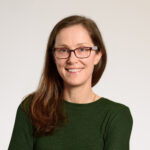Growing up, UNC Associate Professor of Orthopaedics J. Megan M. Patterson, MD, was privileged in a way many of her female peers in surgery were not. In a dual surgeon household, her parents set the example for four children that surgery careers with long hospital shifts could be successfully balanced with shared child-raising responsibilities at home. One of the greatest aims now for the Department’s Division Chief of Hand & Microsurgery is to increase awareness among female medical students that a career in surgery and a rewarding family life is attainable. 
Dr. Patterson noted: “I’m blessed my upbringing showed me how women surgeons can have equal success in family and child-raising. I want to show this example to other women who are considering orthopaedics or just getting started in their training.”
During the 2019–2020 application cycle, the most recent year for which American Medical Association (AMA) data* are publicly available, 53.5% of applicants to MD-granting medical schools and 53.7% of matriculating medical school students were women. By sharp contrast, only 6-8% of graduating medical students pursuing orthopaedics were women.
Dr. Patterson leads UNC Orthopaedics’ internal dialogue on the perspectives of and challenges faced by aspiring female orthopaedists pursuing this male-dominated field. While not all women are interested in having children, balancing a career in orthopaedic surgery with child rearing is uniquely challenging to female medical students, trainees, and faculty. Female medical students planning to have a first child during their residency years are outwardly hesitant to go into surgery disciplines. Others plan to hold off on child-bearing as they enter a surgery residency. For those who give birth during residency, male-dominated surgery disciplines like orthopaedics often do not understand the needs of women raising infants who have returned to the workplace, such as ensuring these mothers have a designated, private lactation area for breast milk pumping.
Dr. Patterson stated: “We need better awareness across the field of orthopaedics that we will miss out on attracting top female medical students if we don’t accommodate those who are both career-minded and family oriented.”
“I’m proud that our Department’s residency program is currently training eight women. I have such a great job, and it blows my mind orthopaedics doesn’t recruit more of my own.”
Dr. Patterson and other female Diversity, Equity, and Inclusion (DEI) Liaisons have mentored female medical students at UNC SOM on specialties such as orthopaedics and other surgical disciplines they may be hesitant to pursue.
As a competitive, top-tier public institution, UNC excels in recruiting and retaining female faculty. Within UNC SOM, however, many disciplines face challenges in creating environments that uphold equality and inclusivity for medical students and faculty who do not have the look or backgrounds of the majority. Dr. Patterson’s passion for closing the gender gap extends to improving overall diversity. She has become the Department’s DEI leader for addressing shortfalls in under-represented minorities (URMs) in orthopaedics and medicine. As UNC Orthopaedics’ DEI committee Chair, Dr. Patterson leads discussion amongst committee members on ways of making the workplace more welcoming for Department members of wide-ranging ethnicities, races and orientations. As the Department’s Liaison to the SOM’s Office of DEI, she and UNC SOM faculty peers sustain ongoing dialogue in strategizing how Surgery and Medicine disciplines can build and uphold environments that uniformly appeal to, train, recruit and retain top-performing, next-generation physicians from all backgrounds.
She stated: “People want to see in medicine what they are. It’s powerful to see someone like yourself doing what you want to do.”
Dr. Patterson oversees a highly talented, patient-focused Hand and Microsurgery team whose members work within an egalitarian OR environment. With over 10 years of practicing in large teaching hospitals, she has observed a crisis of workplace culture as a challenge that many surgical disciplines face in sustaining long-term strength, growth, and success.
“What hurts our specialty most is the perception that orthopaedics is a ‘jock-culture.’ The majority white male nature of our field puts us at risk of using exclusionary ‘banter’ in the OR, clinics, and conferences, which runs the risk of isolating [URM] team members working alongside them.
When a surgical discipline permits a joking culture in the OR, clinics, or conferences that drives exclusion and discrimination, those in the minority, including medical students observing, feel voiceless. They say to themselves, ‘I have no power in this OR, in this specialty, in this department.’ It is up to leadership, not those most affected, to identify factors that most negatively affect URMs in these settings and to direct those perpetuating this culture toward change for the better.”
Dr. Patterson concluded: “UNC Orthopaedics must keep the Carolina Way close to heart in sustaining diversity across its ranks. Every field of medicine wants the best and the brightest. It’s critical to remain mindful of how critical [ are to sustaining our field’s strength and appeal. If we don’t keep our foot pumping the gas, changing our specialty will never happen.”
* AMA-ASSN.org: Women in medical schools: Dig into latest record-breaking numbers – September 29, 2021. Author: Brendan Murphy.

